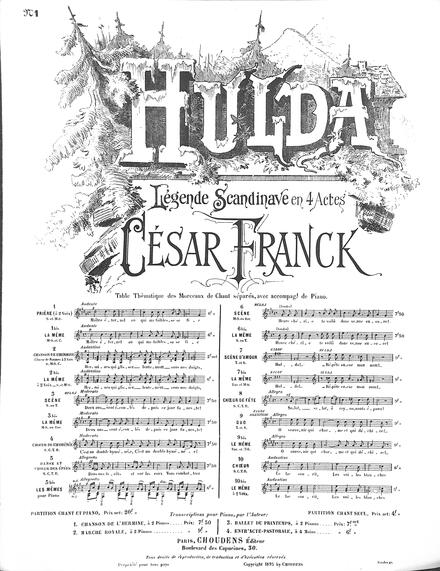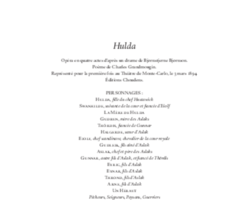Hulda

Opera in four acts and an epilogue after Bjørnstjerne Bjørnson’s Halte-Hulda. First performance of a revised abridged version in Monte Carlo on 4 March 1894. First performance of the complete version in London (University College Opera) on 15 March 1994.
Hulda, composed between 1879 and 1885, was never staged during César Franck’s lifetime and waited for more than a century before it was given its first complete performance. Inspired by a Norwegian play by Bjørnstjerne Bjørnson (1832–1910), this bloody medieval legend recounts the multiple vengeances of its eponymous heroine against the Aslak clan, the tormenters of her family, and then against Eiolf, an emissary of the Norwegian king who turns out to be an unfaithful lover. Although the Nordic imagery may evoke that of Wagnerian productions, the composer remained in the tradition of French grand opéra while adopting the language used by Verdi at the time. Rejected in Paris by both the Opéra and Opéra-Comique, then in Brussels by the Théâtre de la Monnaie, this ambitious opera turned out to be a major disappointment for a composer doomed to be admired only in the instrumental field. Franck’s death, however, generated a new interest in his unpublished works, and the Monte Carlo theatre scheduled the premiere of Hulda in March 1894 with Blanche Deschamps-Jéhin in the title role. Produced in an abridged version and with a minimalist staging, the work failed to arouse any passionate reactions. It was then cleverly shelved by Franck’s pupils: preferring to remember him as a composer of absolute music, they took on for themselves the glory of embodying the revival of French Opera. These issues are now obsolete, and we are left with Hulda: “a high-flying score, brimming with invention, with a gripping evocative force and a lyrical quality of the highest order” (Joël-Marie Fauquet).
Scientific publications
Publication
César Franck. Hulda
Articles
‘Modulez, modulez!’
Articles


